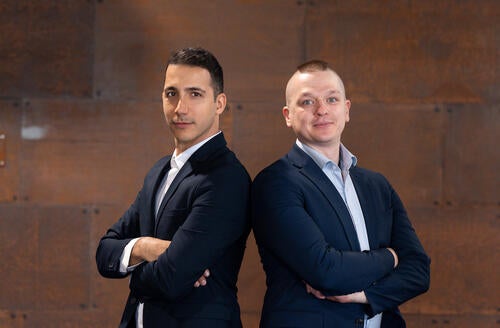Artificial intelligence has made protein design lightning fast, creating digital blueprints for cures to some of the most life-limiting ailments. While this means we now have thousands of new potential therapeutics, for these cures to be realized the designs need to be synthesized and validated in a laboratory environment, which can take a considerable amount of time.
Liberum Bio, part of the University of Waterloo's Velocity incubator, has raised a $1.8 million seed round to further develop its proprietary technology that is solving this problem by accelerating the synthesis and testing of unrealized life-saving therapeutics.
"Our mission is to liberate life-saving solutions from their digital purgatory," said Aidan Tinafar, co-founder and CEO of Liberum Bio. "If you can reduce the time and cost to test those potential lifesaving therapeutics you can save more lives faster and that's what gets us excited every day."

Image L-R: Co-founders Aidan Tinafar, CEO, and Alexander Klenov, chief technology officer
Tinafar said Liberum customers' protein design capabilities are outstripping their production capacity and that's why they come to Liberum Bio.
"We offer protein synthesis as a service on the cloud, so companies bring us their digital sequences and in as little as two weeks they receive their purified proteins," he added.
Building on technology invented in the 1950s', the company's cell-free technology, consisting of proprietary cartridges, highly engineered source strains and reaction mixtures, produces proteins at high yields outside of living cells, at the fraction of the usual cost and time.
"We see ourselves not simply as a cell-free biotech company, but rather a protein synthesis powerhouse," Tinafar said. "Our cell-free system now outperforms state-of-the-art cell-based platforms."
Already having shipped to more than 45 labs around the world with multiple repeat purchases, Liberum Bio plans to increase its production capacity, expand its team and increase the repertoire of available proteins for their customers.
"Our technology has the potential to completely replace traditional small-scale protein production in the laboratory," said Alexander Klenov, Liberum Bio co-founder and chief technology officer. "The artificial intelligence that is running these companies' pipelines is hungry for data and we are exponentially speeding up the process to get physical proteins made and data fed back into their algorithms."
Liberum Bio's technology is not specific to solving the backlog of protein design in the pharmaceutical industry. Protein synthesis is used to produce enzymes that will clean the environment and materials that go into everyday consumable products.
Since joining Velocity in 2021 and gaining access to the incubator's resources, labs and networks, Liberum Bio has filed the necessary patents and made advances key to getting the company's groundbreaking technology into the hands of consumers.






